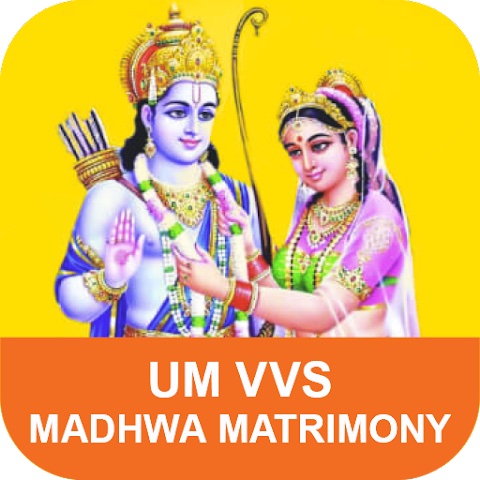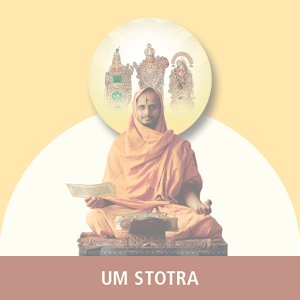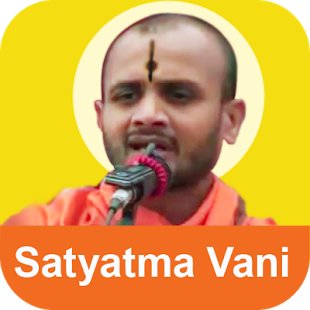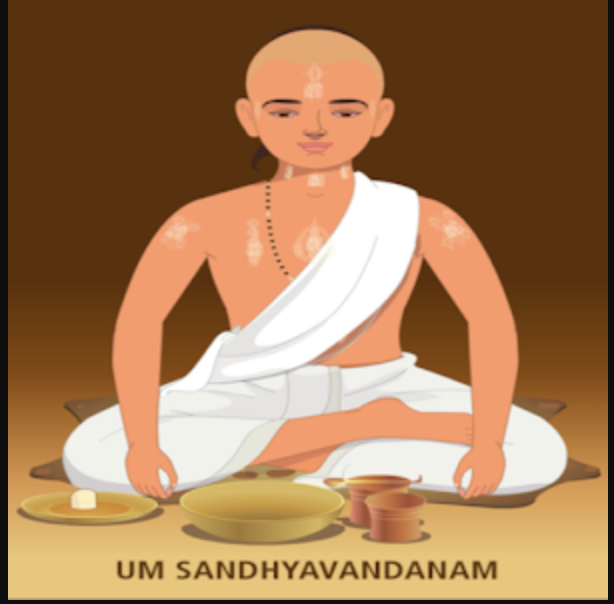Purchase UM panchanga/publications online at vmmp.org
Parampara/ Sri Vidyadhisha Tirtha
श्रीमद्सुधाद्भुताम्बोधिविक्रीडनविचक्षणान्।
वाक्यार्थचन्द्रिकाकारान् विद्याधीशगुरून् भजे॥
|| shrImadsudhAdbhutAmbodhivikrIDanavicaxaNAn .
vAkyArthachandrikAkArAn vidyAdhIshagurUn bhaje ||

On the bank of river Godavari there is a small town called Punyastambhapura or Punatambe. It is in Ahmednagar district of Maharashtra. In this town lived a pious brahmin by name Pandurangi Ananda Bhattaraka. Initially he was not a learned man though he belonged to a learned family. He propitiated Goddess Mahalakshmi at Kolhapur for twelve years. Goddess Mahalakshmi appeared in his dream and told him that she would appear before him in the form of a serpent next morning and he should hold her. Accordingly she appeared before him when he was meditating upon the Goddess standing before her. The serpent moved round the image of Goddess Mahalakshmi thrice. Anandabhattaraka remembered the dream and tried to take the serpent by hand as it was entering into a nearby hole. He could touch tip of the serpent once by his ten fingers and once again by one. Thus he secured learning, wealth, and noble progeny for eleven generations with the blessings of Goddess Mahalakshmi. He then proceeded to Varanasi to study shaastra-s. He became a great scholar and returned to his native place Punyastambhapura.
Sri Anandabhattaraka was blessed with a son by the blessings of Mahalakshmi and Shri Vadiraja Teertha of Sonda Math called Narasimhacharya who later accepted sanyasa and became famous as Vidyadheesha Tirtharu.
NARASIMHACHARYA'S EARLY CAREER:
Narasimhacharya studied the shaastra-s under his father. He became a great scholar in Nyaya, Mimamsa, Vyakarana and Vedanta when he was just sixteen years old. He started teaching these shastras at Trivikrama temple in Punyastambhapura. He defeated Sivapandita and Visvapandita in a debate in Vyakarana Shastra. Similarly he defeated Golinga pandita in Nyaya and Tanabhatta in Srautasutras.
There was a Muslim invasion on Punyastambhapura. Narasimhacharya had to leave that town with his family and disciples. He went to Nasika Tryambaka and lived there for two years. Later Dattapandita the son of Naganatha invited him to Sangamner and Paithan. This Naganatha Dattapandita was a subedar at Paithan under Shahaji the father of Shivaji. He later became the subedar of Bangalore. From Paithan Narasimhacharya went to Pandharpur. There was an old Matha at Pandharpur established by Shri Padmanabha Teertha to welcome Shri Madhwacharya. Shri Madhvacharya had visited this Matha. Narasimhacharya renovated this Matha.
Here a scholar by name Narasapandita was defeated in a debate by Narasimhacharya. This Narasapandita went to Bijapur and was given shelter by one Lingojipandita. This Lingojipandita was a member of the team that went to meet the Moghal Emperor on behalf of Adilshah of Bijapur. Narasimhacharya was also invited to Bijapur by Lakshmanapandita. Here Narasapandita once again debated with Narasimhacharya and was defeated. NARASIMHACHARYA WAS GIVEN SANYASA AND NAMED AS VIDYAADHEESHA TEERTHA .
At this time, Shri Vedavyasa Teertha of Uttaradi Matha was camping at Mannur on the bank of the river Bhima. He asked Narasimhacharya to meet him. He gave him sanyaasa, made him his successor for the throne, and named him Shri Vidyadheesha Teertha. With the blessings of his Guru, Shri Vidyadheesha Teertha undertook a tour. He went to Sangli on the bank of the river Krishna for his first chaturmasya. Then he went to Karavirapura or Kolhapur. He toured Karhad area consisting of the present Satara and Sangli districts in Maharashtra. He returned to Penugonda to meet his guru Shri Vedavyasa Teertha. Then he was invited by Shri Chamarajendra of Shrirangapattana. This ruler was suffering from food allergy. Shri Vidyaadheesha Teertha cured his allergy by sprinkling Teertha (sanctified water) over his food. Pleased at this, Chamaraja donated three villages to him.
Shri Vidyadheesha established Mukhyaprana image in a village called Chandaguru and also Shrirangapattana in the premises of Uttaradi Matha. He toured the whole of South India. After visiting Rameshwaram he went to Udupi. From Udupi he went to Ikkeri and defeated Rangojibhatta in a philosophical debate. The event of this debate is recorded by Kondabhatta in his work Vaiyakaranabhushanasara in the closing verses. There is a small manuscript named Rangojibhattaparajaya giving details of this debate. Then he returned to Penugonda. At this time Shri Vedavyasa Teertha entered vrindaavana. Shri Vidyaadheesha performed his guru's aradhana in a fitting manner. He distributed five thousand gold coins as dakshina to the pandits assembled on the occasion.
SHRI VIDYAADHEESHA'S TOUR OF SOUTH INDIA AND GODAVARI PRADAKSHINA:
Shri Vidyadheesha Teertha once again visited Udupi and performed his chaturmasya. During this stay he composed his magnum opus, the most popular commentary to Shri ManNyayaSudha viz., "Vakyarthachandrika" on the first five adhikaraNa-s of Nyaaya-sudha. Then, he proceeded to conduct a pradakshina of the river Godavari. He started the pradakshina from Nasikatrayambaka where the river originates. From this place he proceeded along the bank of the river with hundred pandits, visited Bhadrachala, Konasima, and Antarvedi. From there he took the round of the seven streams of Godavari and started his return journey. He went to Dharmapuri on the way and finally returned to Nasikatrayambaka. Then he proceeded to Chola country again. On his way he visited Tirumala and offered his services to Lord Venkateswara. He visited Kalahasti and reached Shrirangam. He performed his Guru's ArAdhana at Shrirangam in a grand manner. Tirumala Nayak, the chieftain of Trichanapally came and paid his respects to Shri Vidyaadheesha Teertha and provided all the supplies for the ArAdhana. Then he went to Tanjavur and was honoured by Raghunatha Nayaka. Further, he went to Kumbhakonam. He met Shri Sudhindra Teertha who was camping at Kumbhakonam. The two honoured each other. Then he proceeded to Madurai and finally reached Rameswaram. From Rameswaram he returned to Dharmapuri on the bank of river Godavari. This was an important center of Uttaradhimatha in those days. Shri Vasudevayati Purnabodhacharya, etc., prominent disciples of that town, welcomed him. He performed his chAturmAsya at Dharmapuri. Shri Yadavarya, his purvasram younger brother Keshavacharya (Gururaja), Shrimushnam Anandacharya, Rotti Venkatabhatta, Dharmasuri and several other distinguished scholars used to sit at the feet of Shri VidyadhiishaTeertha and study Shri Nyayasudha. During his stay at Dharmapuri two Advaita Scholars, Ramabhadrashramin and Kamadeva were engaged in philosophical debate and were defeated.
SHRI VIDYAADHEESHA'S NORTH INDIAN TOUR:
Then he decided to tour North India and visit Badarikshetra. He entrusted the worship of Shri Mula Rama to his disciple and successor Shri Vedanidhi Teertha and proceeded towards Prayaga. After taking a bath at the Triveni confluence and worshipping Veni Madhava he went to Varanasi. He discoursed on Dvaita philosophy at Varanasi in the assembly of great scholars. The well-known Advaita scholar Brahmendra Saraswathi who was then residing in Varanasi was disturbed by this programme. However, a confrontation was avoided and Shri Vidyaadhiisha Teertha proceeded to Gaya. The `gayAvADa-s demanded high fees for piNDadAna from the disciples of Uttaradi Matha. They were Tantrikas and were proud of their position. Shri Vidyadhiisha showed his miraculous power to them by making the ancient Vatavriksha, which had gone dry for some time, grow anew by TeerthaprokshaNa. They were wonderstruck and received Maadhvadiiksha from Shri Vidyadhiisha. They follow Dwaita faith even now. He got a building for Uttaradi Matha built in the premises of Vishnupada temple. He established a Mukhyaprana image at the Uttaradi Matha. Uttaradi Matha here has the privilege of offering puuja & naivedya to Vishnupada everyday even today. From Gaya he proceeded to Ayodhya, Mathura, Vrindavana, Kurukshetra and finally reached Badarikshetra. He worshipped Lord Narayana with great devotion. Returning from Badari he reached Ekachakranagara (Capital of Virataaraja during Dvapara yuga) situated in the valley between Yamuna and Ganga. He informed his disciples that he proposed to enter Vrindavana. A Vrindavana was prepared on the banks of river Ganga and he entered the same with Yogic power in the presence of his disciples. His disciples brought the images of the deities worshipped by him to Dharmapuri and handed them over to his successor Shri Vedaninidhi Teertha. Shri VedaninidhiTeertha worshipped the deities keeping them by the side of Shri Mula Ramadeva Pratima that was already given to him. Thus, Shri Vidyaadhiisha Teertha added a great chapter to the history of Shri Uttaradi Matha and Dvaita sampradaya.
An image of Shri Vidyaadhiisha Teertha was prepared when he was at Prayaga at the request of one Narasappa, a great devotee of Shri Vidyaadhiisha. This Narasappa later took sanyasa from Shri Vidyaadhiisha and became Narasimhayati. He brought this image to Dharmapuri. It was there for about a century. This Narasimhayati has written Khandhartha-s for the Upanishads. Later Pandurangi Balayyacharya brought the image to Masuru in Dharwad District which was then the head-quarters of Pandurangi family. After another century Pandurangi Huchchacharya of Tumminakatti brought it to Ranibennur. A Matha was established there and ArAdhana is being performed every year. Thus, now Ranibennur is the head-quarters of Pandurangi family though three are only two or three families left over now.
Sloka Audio
brindavana at
Ranebennur
works
Vyakyartha Chandrika: A commentary on Shriman Nyayasudha for first five adhikarana-s. Vishnutattvanirnayatippani: A commentary on Shrimad Achaarya's VTVN (not available) Pramanalakshanatippani: A commentary on Shrimad Achaarya's Pramnaa-lakshana (not available) Kathalakshanatippani: A commentary on Shrimad Achaarya's KathAlakshaNa (not available) Talavakopanishidkhandartham: A commentary on TaLavakAropanishhad (not available) Ekadashinirnaya: An independent work on how to determine ekadashi Janmashhtaminirnaya: An independent work on how to determine kR^ishhNa jayanti (janmAshhTami) Vishnupajnchakanirnaya: An independent work on how to determine days for vishNupanchaka vrata Tithitrayanirnaya: An independent work on how to determine tithi Omkaravada: An exposition on the word OM
contact details
Phone no:08373-262524/9481042484






